The Finnish festival field got a top-class newcomer this year when Hellsinki Metal Festival was unleashed upon the world on the 11th and 12th of August. With two days of finely curated bands from black and power metal to prog and synthwave, Hellsinki Metal Festival had an ambitious goal of fulfilling the gap left behind by Tuska, as promoter Toni Törrönen told our Finnish-speaking magazine Kaaoszine. The statement can feel confusing considering Tuska hasn’t gone anywhere, but it’s clear that there is a demand for a smaller metal festival with a lineup that can be described as traditional and extreme, yet very multifaceted.
Arranged in the Helsinki Ice Hall area, commonly called Nordis, the festival brought a total of 34 bands and attracted some 11 000 guests over the weekend. The bands were spread across three different stages: two main stages next to each other outside the ice hall and the indoor Kaaos Stage. The latter was basically the same as Helsinki Ice Hall Black Box: the seats were blocked with curtains and about 3000 people could fit in. Besides the Black Box, Hellsinki Metal Festival also took advantage of other perks offered by the ice hall. The toilets were in use, and down the hallway, one could find a bazaar with vendors offering walk-in tattoos and whatnot. All in all, I found the area to function very well especially considering this was the first time the festival was arranged. For the bravest of us, there was also bungee jumping and a bouncing castle.
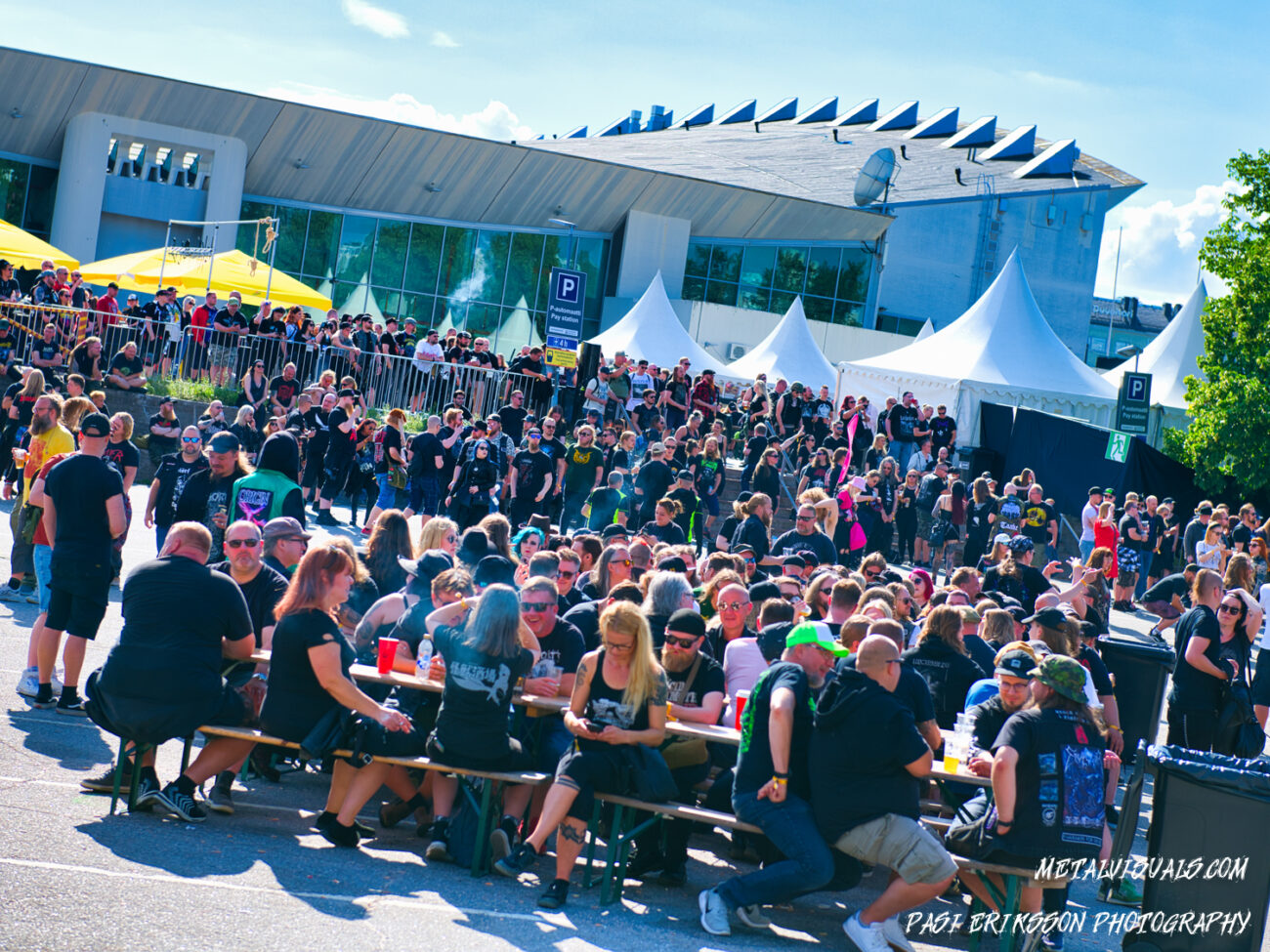
But the main reason I chose to visit the festival was the bands. Both days included plenty of unforgettable gigs, with my personal highlights ranging from black metallers such as Emperor, Watain and Dark Funeral to doom metal pioneers Pentagram and Swedish synthwave miracle Priest. The first day was kicked off at 1:30 p.m. by two Finnish acts: melodic death metallers Mors Subita from Haukipudas, Northern Ostrobothnia and local tech death act Omnivortex, who had the honor of representing Finland at Wacken Metal Battle at the legendary Wacken Open Air earlier in August. Since I prefer my death metal uglier and more aggressive, I chose the latter.
Formed in 2019 and releasing their debut album “Diagrams of Consciousness” the following year, Omnivortex has quickly become a force to be reckoned with. I’d already seen them a couple of times at smaller local venues, but it was a delight to see them take over the indoor stage with absolute ease. That’s not a small feat considering this stage typically hosts bands of the caliber of Behemoth and Amon Amarth. Each member wielded a hungry energy that, combined with the brilliant yet wild and untamed compositions, literally sucked me in like a cosmic vortex (pun not intended). Whether evoking cosmic horrors with atmospheric sections or blasting away like there’s no tomorrow, Omnivortex displayed remarkable talent. The atmospheric sections may not be quite up there with Ulcerate, whom I saw last year, but the overall package is strong enough to recommend to everyone who likes technical death metal with wild energy and a menacing feeling. Mark your calendars for the 29th of September; that’s when the band’s second full-length album, which bears the name “Circulate”, drops.
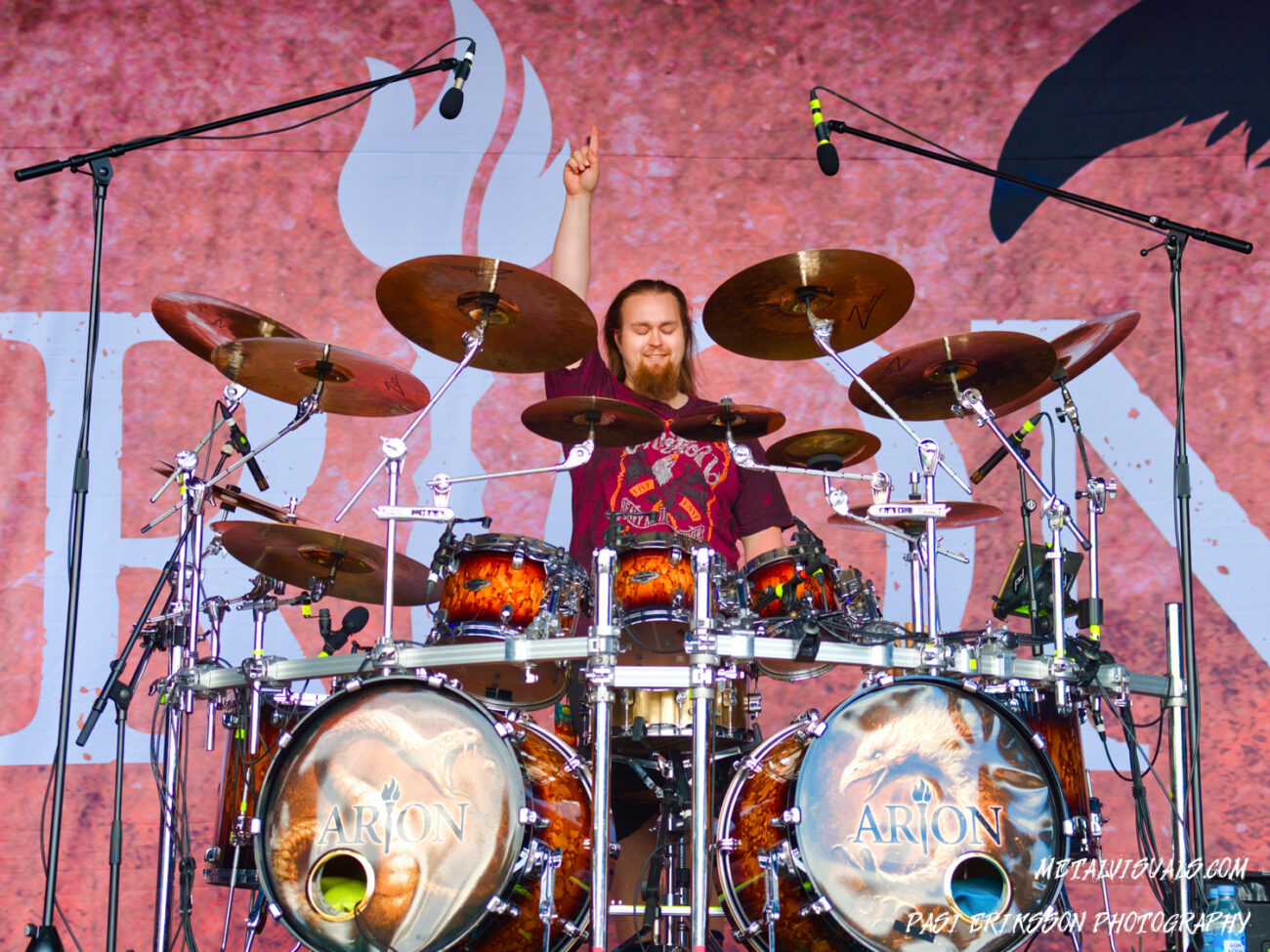
Next up was another local act, symphonic power metallers Arion. Formed in 2011, the band has released three full-length albums and supported Dream Theater on their Finnish dates earlier this year. You could really sense that these folks are used to and enjoy being on stage, such was their energy. I often find power metal too sugary, but Arion had plenty of heavier moments and catchy vocal melodies. “I Don’t Fear You”, taken from their latest album “Vultures Die Alone” (2021), sounded particularly good. On the other hand, despite having catchy and heavier parts, most other songs were too uplifting for my taste. They didn’t really stick with me either unlike, let’s say, old Battle Beast. Nevertheless, it’s clear that the band knows how to handle their instruments. Keyboardist Arttu Vauhkonen couldn’t make it to the show, but the rest of the band managed to fill the outdoor stage just fine. It would have been tasty to hear the keyboard parts played live, though. This time they understandably came from a backing track.
The downside of having such a strong lineup is that you have to make difficult decisions. On the indoor Kaaos Stage, I could witness Asagraum, one of my favorite black metal bands, who also happen to be an all-female band. Meanwhile, the second main stage would be conquered by Canadian long-running legends Voivod, who are celebrating the 40th anniversary of their colorful career. With Asagraum releasing a new album shortly, I decided to count on getting another opportunity to witness their live ritual and opted for Voivod. As a matter of fact, I tried to see both, but more on that later. Let us cherish the Canadian thrash and prog masters.
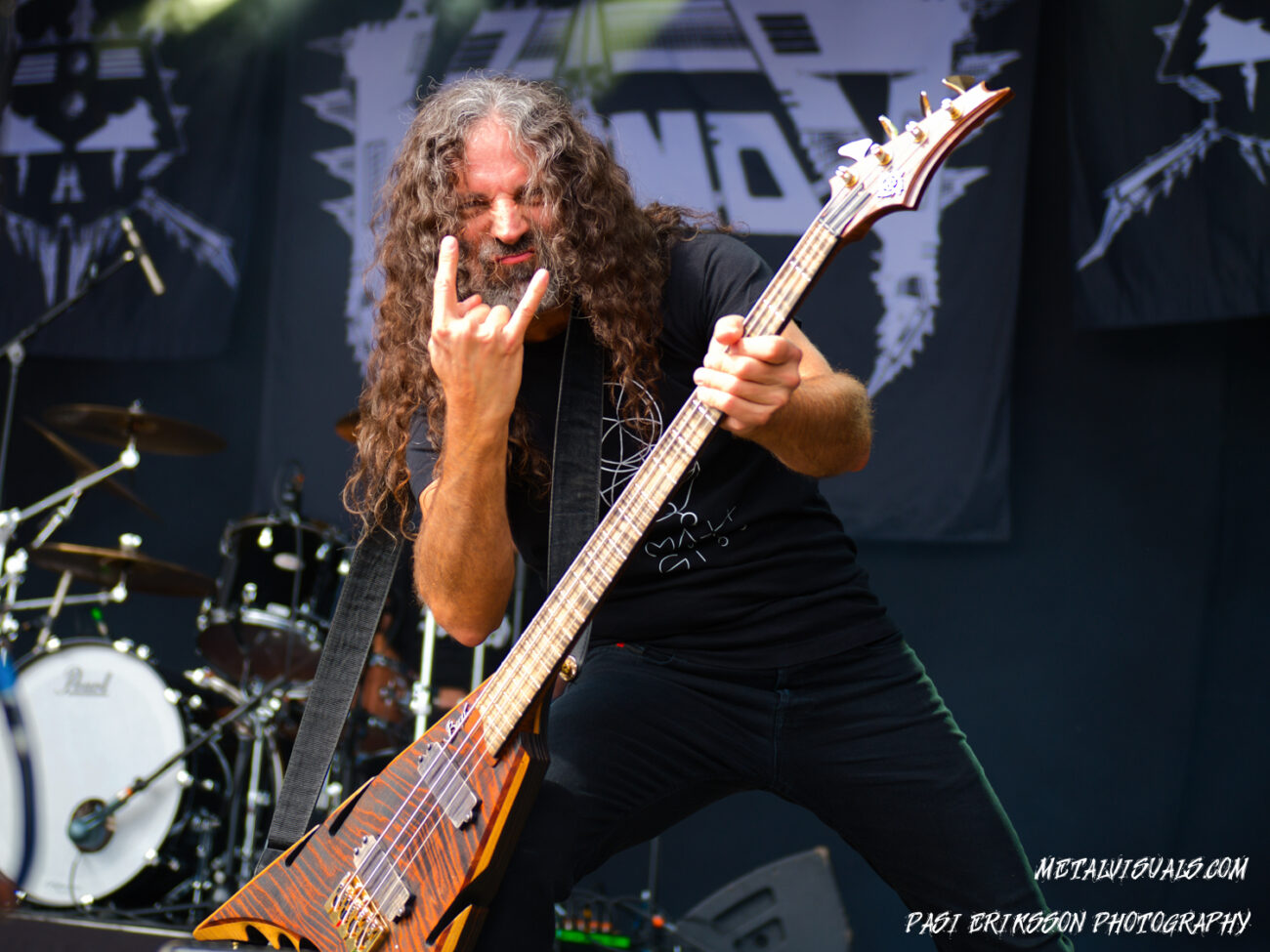
Formed in 1981, Voivod started their career with in-your-face speed metal and eventually moved on to a more progressive approach with such classic releases as “Killing Technology”, “Dimension Hatröss” and “Nothingface.” The latest release in their huge catalog of sixteen full-lengths is “Morgöth Tales”, a collection of re-recorded older songs and a new track to celebrate the band’s 40th anniversary. Having never seen them live, I didn’t really know what to expect from a band of this age but was cautiously optimistic.
And deliver they did. When the first notes of the masterpiece of progressive thrash metal that is “Killing Technology” were unleashed, I knew I was in for a treat. The band may not constantly run from one end of the stage to the other like some of their younger peers, but the music spoke for itself and the musicians had a good charisma. Vocalist Denis “Snake” Bélanger had an especially likable and charming attitude on stage, and it was clear the band did not disappoint their fans. The 50-60 minute set spanned the band’s entire career all the way from the very first album to 2022’s “Synchro Anarchy.” I strongly preferred the thrashier numbers, but Voivod’s brand of prog metal is also great even if I can’t consider myself a fan of the genre in general. All in all, it was a great gig, though I can’t help but feel that the music would benefit from a little more energetic performance. Nevertheless, this rare occasion was well worth the wait, and celebrating the band and late guitarist Denis “Piggy” D’Amour’s (R.I.P.) legacy was a time to remember.
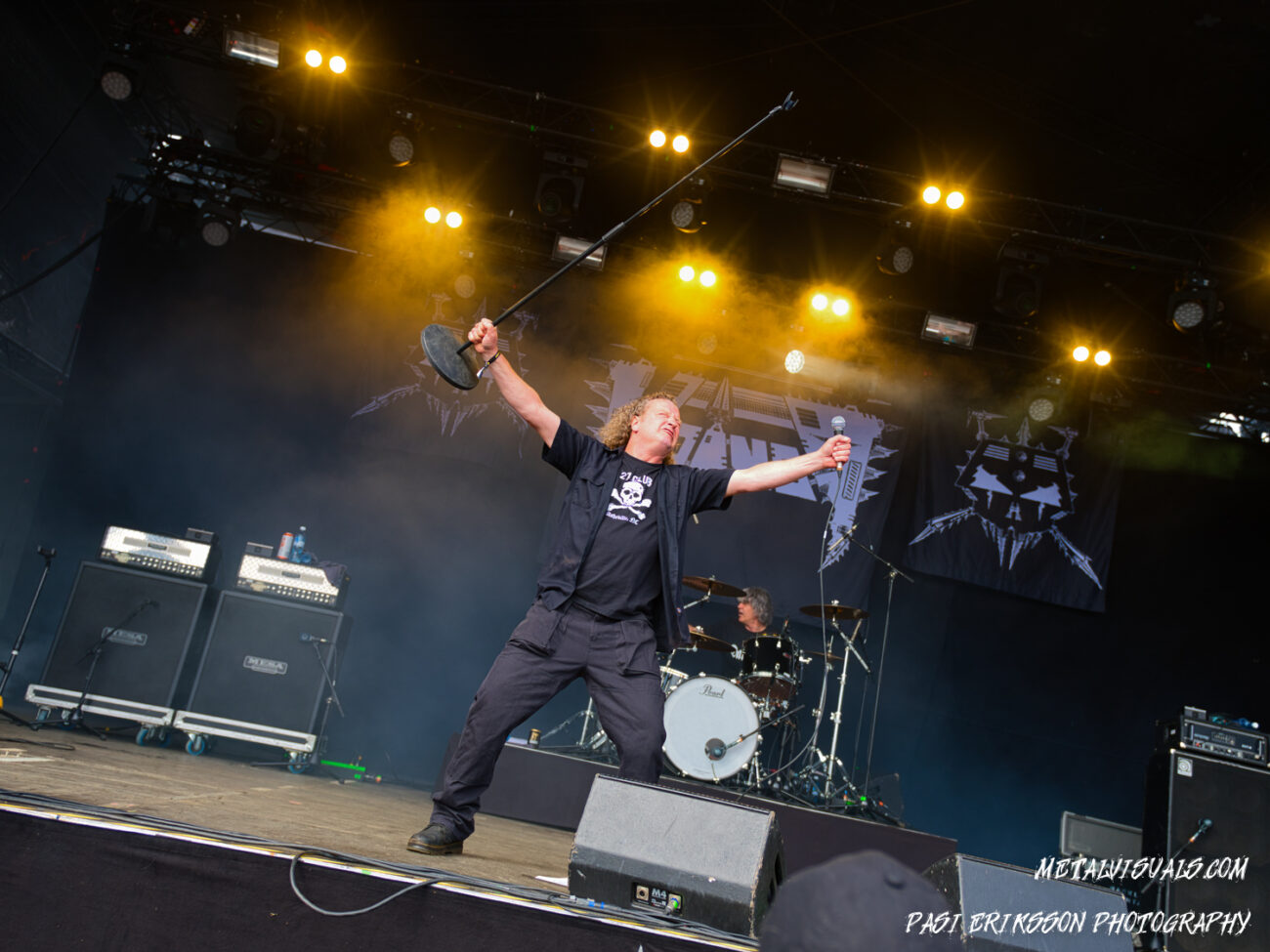
Before the end of Voivod’s show, I was hoping to make a sacrifice and trade 20 minutes of Canadian thrash and prog metal for 20 minutes of majestic Dutch black metal. In the end, I only managed to catch one 5-ish minute ceremonial piece of the latter and missed just one Voivod song. But from what little I saw, Asagraum seemed to be at the top of their game. Taking their name from a Sumerian demon and the Greek word for “room”, Asagraum gained plenty of positive attention in the black metal world with their magnificent debut album “Potestas Magicum Diaboli” in 2017. Though the music can be described as traditional black metal, and great at that, there’s something exceptional lurking underneath. Behind all the psychedelic elements and more straightforward blasting and screaming lies an emotional charge that’s unlike almost anything I have witnessed in the genre. A beautiful and ominous aura that’s both painful and ecstatic. Conjuring this primal energy live made their show at Steelfest 2018 one of the best gigs I’ve ever seen in any genre, and based on what little I saw of their Hellsinki Metal Festival performance, the band has only grown stronger.
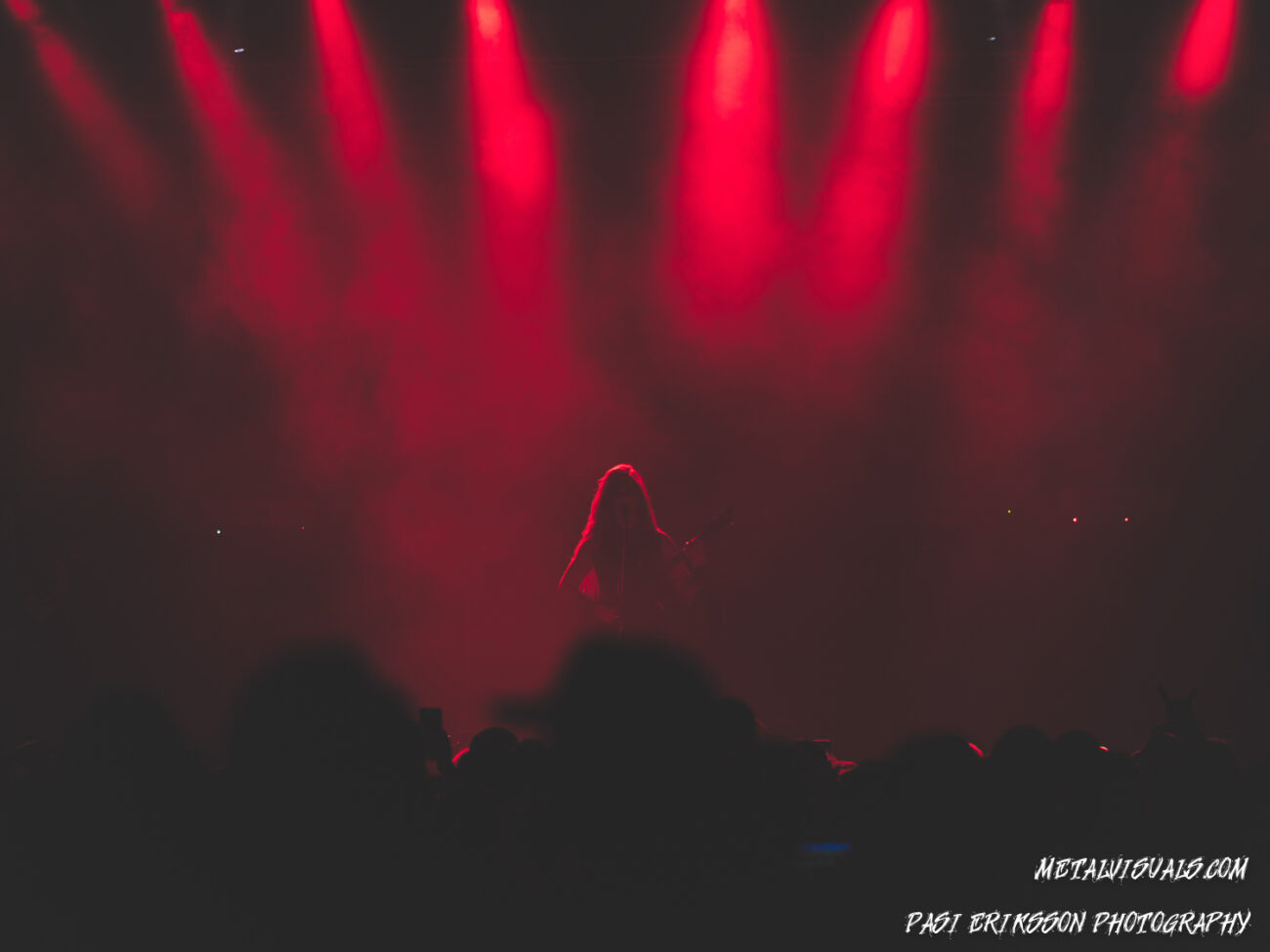
I usually need at least a couple of songs before the emotional charge of a concert starts to properly build up, but Asagraum’s music immediately sucked me in like I’d been there forever. Founding member Obscura’s vocals are not the most versatile or strongest I’ve heard in the genre, but they get the job done and are distinguishable from other bands. Based on the last song of the set, which was unfortunately the only one I managed to catch, the band was yet again in great shape. Whether the said performance is representative of the whole show is another matter that I can’t comment on. I can’t say the crowd seemed disappointed, though.
I was slightly let down by Asagraum‘s previous effort “Dawn of Infinite Fire” (2019), but the recently released single “Impure Fire” promises great things for the group’s third full-length album. Bearing the name “Veil of Death, Ruptured”, the upcoming album will see the light of day on the 20th of October via Edged Circle Productions. I can only hope the album will be followed by another performance in Finland. And yes, besides being a remarkably good black metal band, Asagraum is known for having only female members. So if you thought such a band wouldn’t exist, here you are.
After Asagraum and Voivod, it was time for me to have a food break. The festival had a rather wide array of food vendors offering everything from falafel and chicken wraps to fries, hot dogs and Asian food. Seeing one of my favorite restaurants there left me with little choice, so I opted for my go-to festival meal: Thai Papaya’s Pad Thai dish. The fried rice noodles didn’t disappoint, and it was nice to sit down for a while. On the downside, you couldn’t really see the main stages from the food court and most other seats with a good view were taken. Nevertheless, you could still hear the music quite well. For someone who doesn’t really like rap rock, the Swedish long-running ensemble Clawfinger sounded surprisingly good. But the next main attraction on my list took me back to the Kaaos Stage for another intense black metal show.
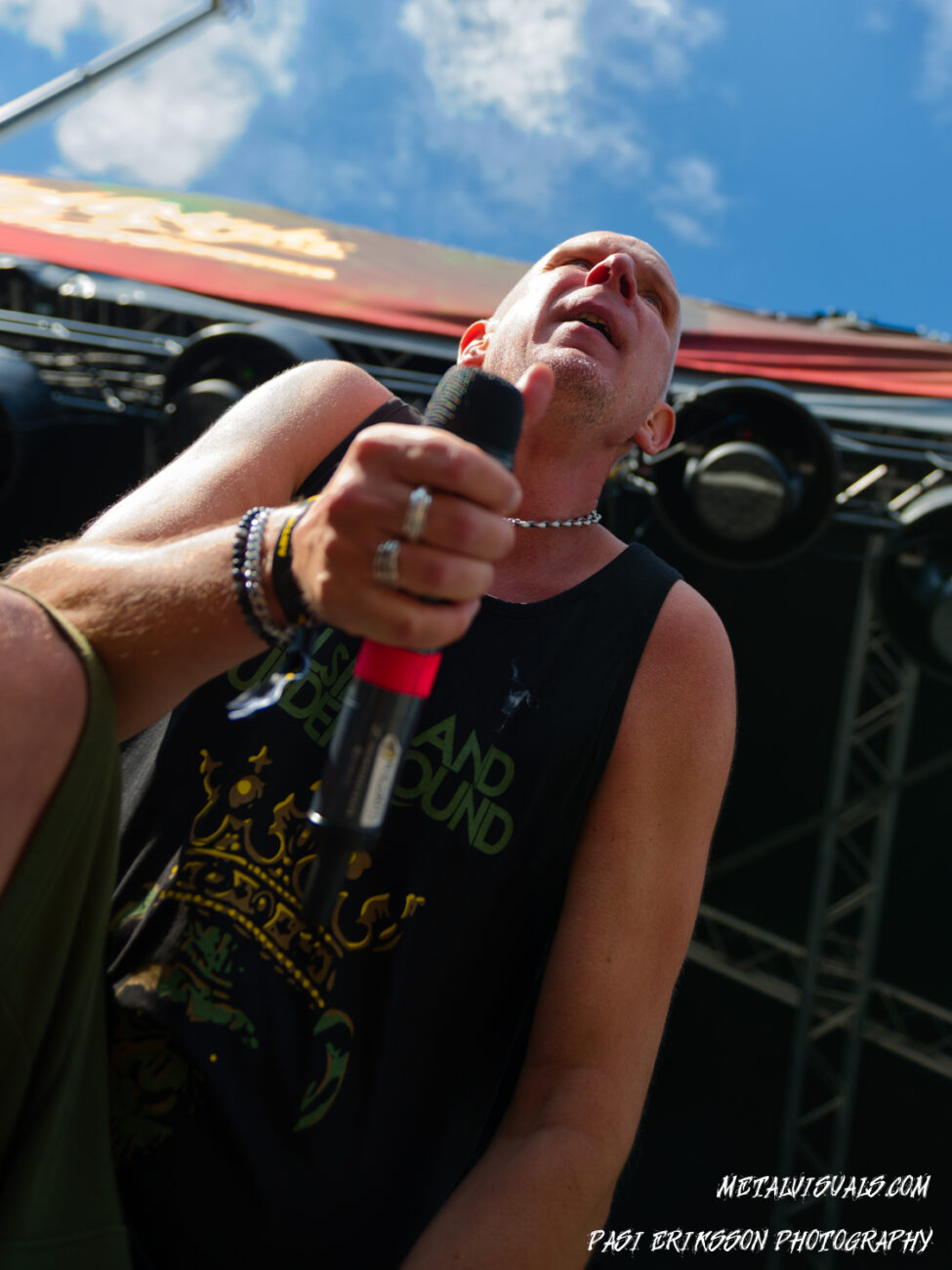
Traditional black metal can be a difficult genre to pull off. Stray too far from the foundation and you lose its essence, imitate the classics too much and you struggle to have your own identity. Then there are the bands that offer little new musically but perform their material with such vile energy that originality becomes less of an issue. In my experience, the next band to hit the Kaaos Stage, Chamber of Unlight, belongs to the latter category. Formed in 2016 in Tampere, Finland, the band plays aggressive black metal with a heavy amount of gloomy keyboards. Whereas their 2021 debut album “Realm of the Night” was solid but ultimately too familiar-sounding for me, the band’s live shows have proved breathtakingly good.
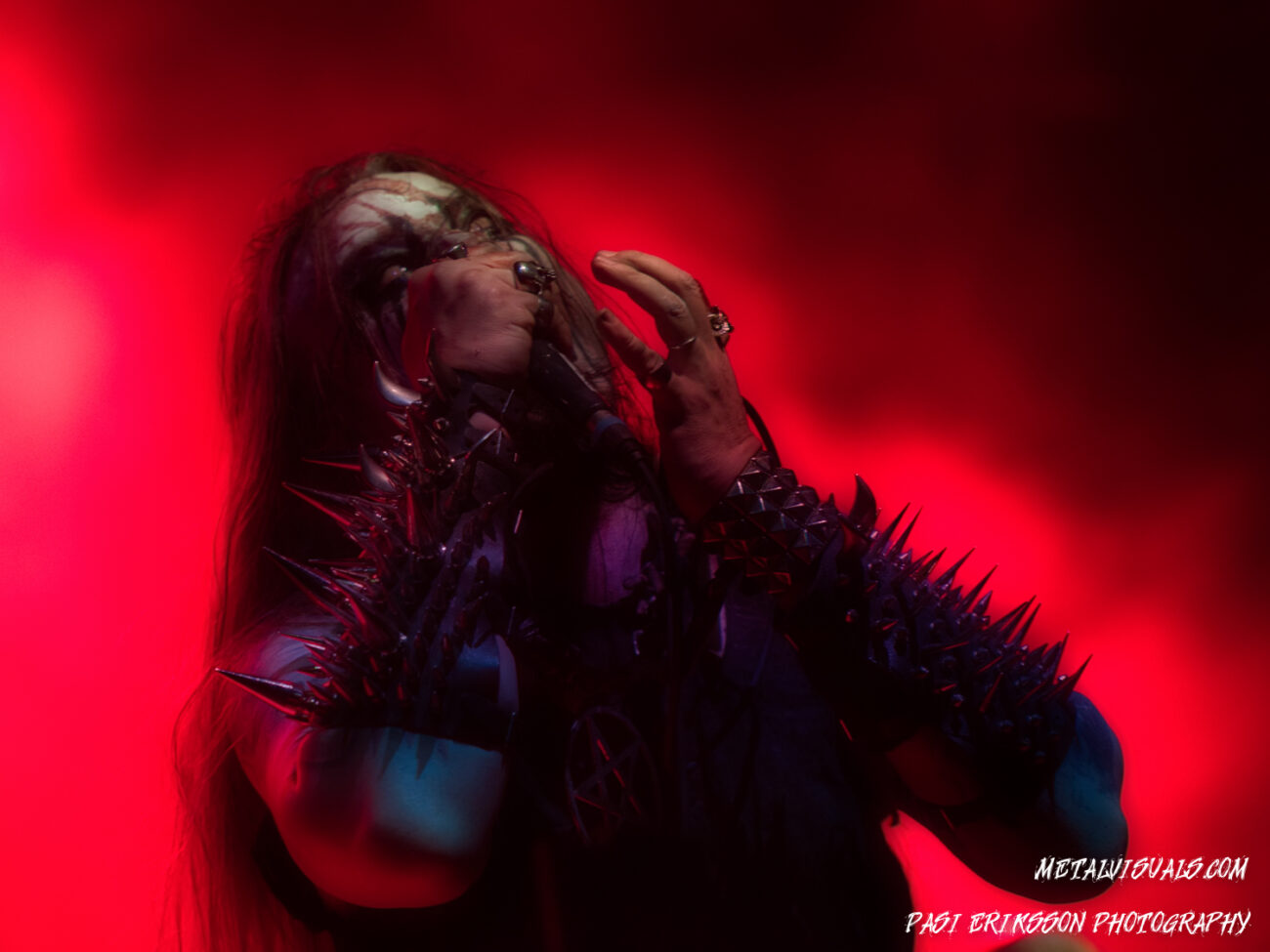
Fronted by Ajattara/Deathchain bassist and former Shade Empire vocalist Necrosis, Chamber of Unlight has an explosive live lineup with members from Horna, Behexen, Sotajumala, Trollheim’s Grott and many other jewels of Finnish extreme metal. This was my third or fourth time catching them live, and I have to say it was probably the best of the bunch. After the ritualistic ambient intro, the band unleashed a tide of majestic black energy captivating enough to make it feel like time itself has stopped. Each musician played extremely tightly, and the band’s ominous stage presence was awe-inspiring to behold. Drummer Kassara, who goes by the stage name LRH in Horna and several other bands, gave an especially memorable performance and proved once again that he’s one of the best black metal drummers around.
I wasn’t sure how Chamber of Unlight’s show would hold up against genre pioneers Emperor, who headlined the second festival day, but in the end, I don’t think the two are mutually exclusive. Even if I prefer Emperor’s material and Chamber of Unlight isn’t the most original band around, the latter offered a stronger sense of wildness and otherworldliness. Small things, such as barely communicating verbally with the audience, helped Chamber of Unlight build a different kind of atmosphere. I enjoyed Emperor’s show more on the whole, but Chamber of Unlight played one of the best and most intense gigs of the first festival day and is a band every fan of symphonic black metal should see live.
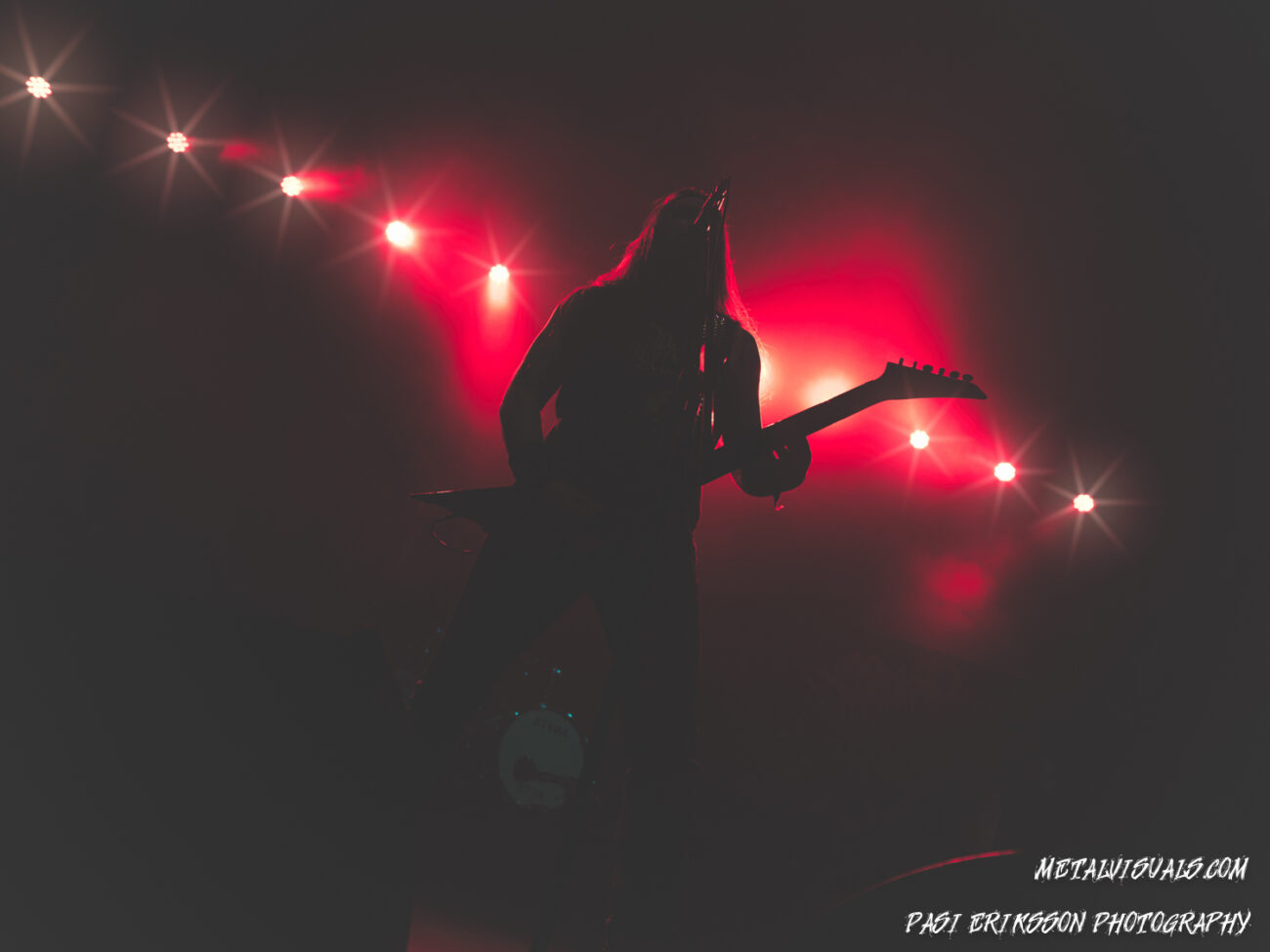
The next band I caught was Suicidal Angels, who have been playing aggressive thrash metal in the vein of Slayer and Kreator since 2001. Even though they’ve been in the business for a while and I’ve known them for years, I never really got around to listening to them properly. The main reason for this is my harsh prejudice against thrash metal made after the genre’s golden age in the 80s. Even though there are several exceptions, I have found most thrash metal bands founded in this millennium to merely recycle ideas their predecessors did much better. I originally meant to see Finnish power metal legends Stratovarius at this time but decided to give these Greeks a fair chance.
That quickly turned out to be a good decision. None of the individual songs were quite on the level of “Angel of Death” or “Pleasure to Kill”, but combined with the energy of the band, the material worked much better than I had anticipated. Displaying more vigor than many of their older peers nowadays, Suicidal Angels put on an intense thrash metal show characterized by vicious riffing and a wild circle pit. The gig even had outright fun moments when an inflatable boat with the head of an unicorn roamed across the mosh pit.
Even if Suicidal Angels’ music offered more depth than I had anticipated, I found few songs to actually stand out. The ones that did, though, were amazing. One such example is “Capital of War”, which included a stellar performance from drummer Orpheas Tzortzopoulos. Still, much of the material all the way from the riffs to vocals was pretty much what you’d expect from the genre. It was therefore vital that the band had such a strong presence on stage. When it comes to thrash metal released this millennium, I still prefer bands who shake up the formula with traces of black metal and the ilk, but Suicidal Angels put on a show I would have regretted missing.
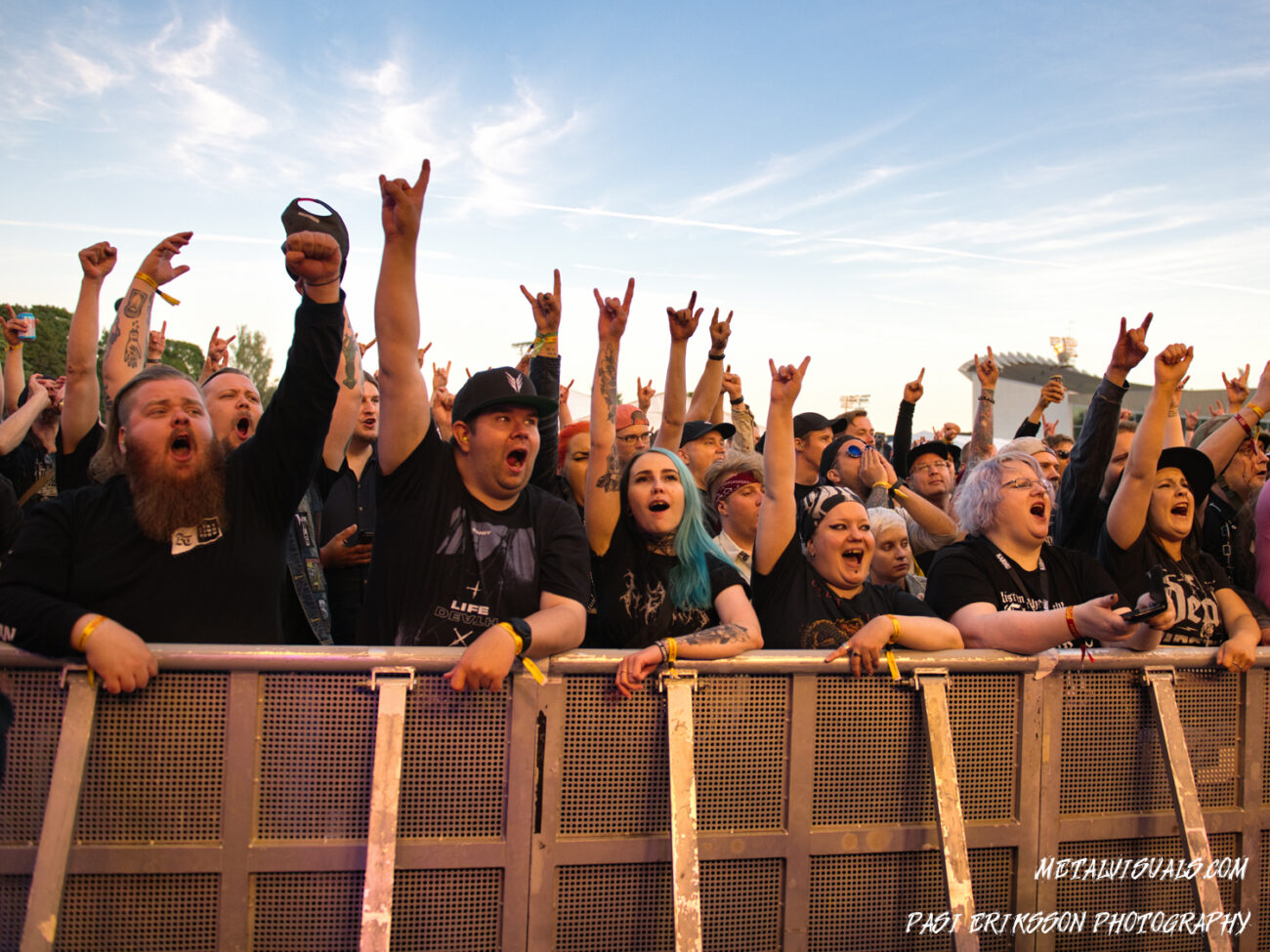
After the retro thrash maelstrom of Suicidal Angels, it was time to go back to the genre’s roots and welcome German legends Sodom to the second main stage. Led by vocalist and bassist Thomas “Tom Angelripper” Such, the band has released some of the very best thrash metal out there and retained a surprising amount of vigor with later releases such as 2020’s “Genesis XIX.” Even though the band is over 40 years old, they managed to deliver their aggressive brand of thrash metal with believable and inspiring viciousness. Long-time fans may be delighted to see guitarist Frank “Blackfire” Gosdzik back in the band’s ranks, though the whole war machine worked like a charm. Newer tracks like “Caligula” and “Sodom & Gomorrah” fit surprisingly well alongside classics such as “Nuclear Winter” and “Agent Orange.” As a black metal fan, I found the early blackened speed metal songs to be the best performances by far. As with most older thrash metal bands, getting older can mean losing some of that juvenile energy, but that didn’t stop Sodom from playing one of the best gigs of the whole festival. It would have been nice if they had a little more playtime.
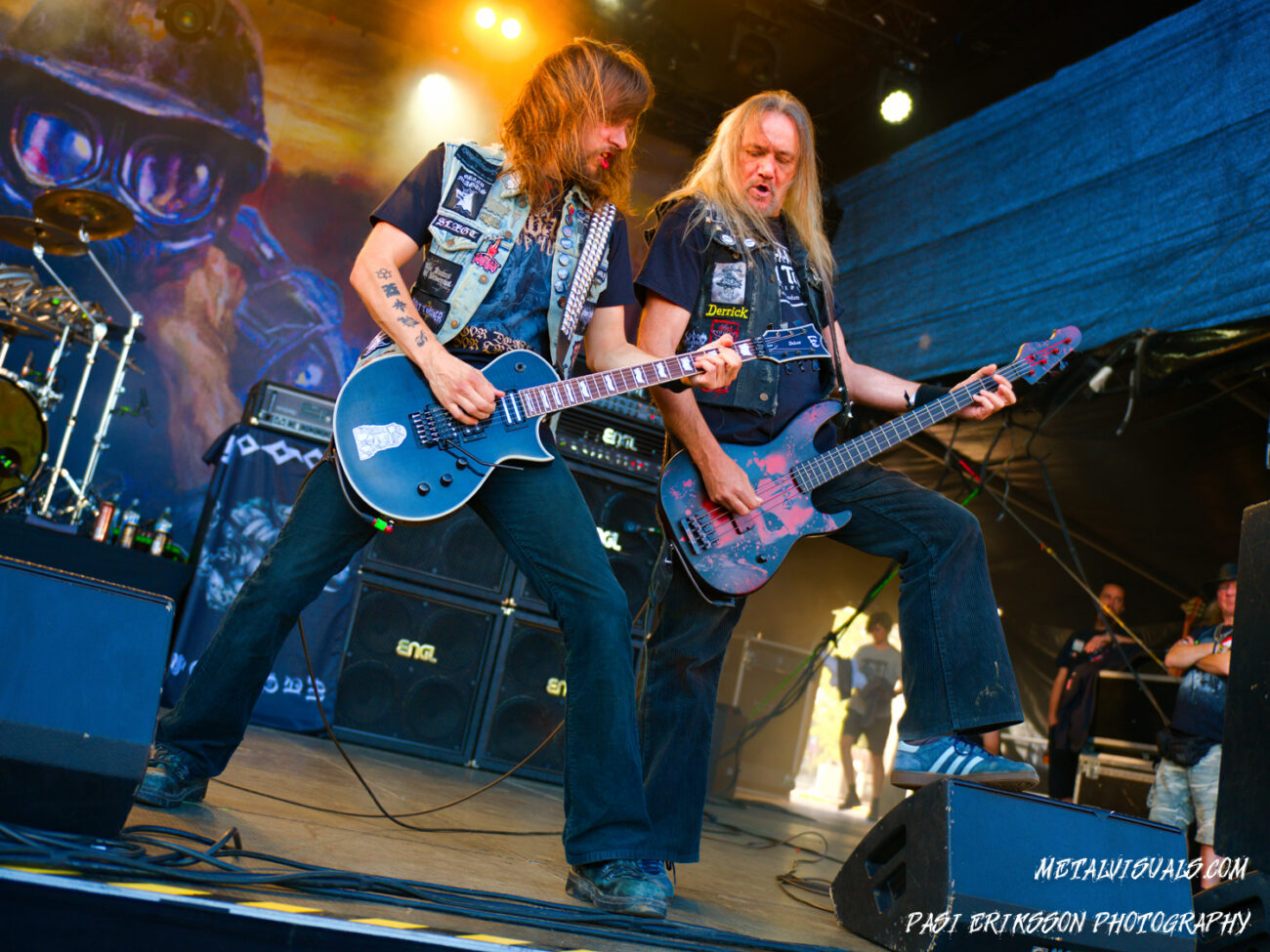
Immediately after Sodom, I headed back to the Kaaos Stage to enjoy the last moments of Benighted’s show. Even though I have never listened to them properly, the French deathgrind act proved extremely catchy in their own brutal way. It’s a shame I only managed to catch the last song, which bore the gore-filled title of “Let the Blood Spill Between My Broken Teeth.” Everything from the surprisingly catchy grooves to the intense energy and tight blast beats was top-notch. The one song I witnessed was enough to prove the band knows what they’re doing and are capable of driving their audience wild. If you’re into Aborted, make sure to check them out. I can’t, of course, tell if each song was of this caliber.
Meanwhile, the first main stage was being conquered by German power metal legends Blind Guardian. Since I was busy enjoying Benighted’s show, I missed some of Blind Guardian’s set, but the Germans seemed to be in rather good shape. I rarely enjoy power metal, but Blind Guardian had enough of old-school heavy metal in their musical DNA to make me go wild. I was pleasantly surprised by how heavy and fast their songs can be, and even the somewhat cheesy choruses were quite catchy. I can’t say I enjoyed the ballads, but Blind Guardian demonstrated an inspiring amount of energy for a band formed in 1987 (or in 1984 with the name Lucifer’s Heritage). The band clearly had loyal fans in the audience since the crowd sang along in a rather loud manner. The band’s own vocals were tasty as well, especially when several members sang at the same time. Much like Sodom, Blind Guardian was another finely aged German metal band who could have used a little more playtime.
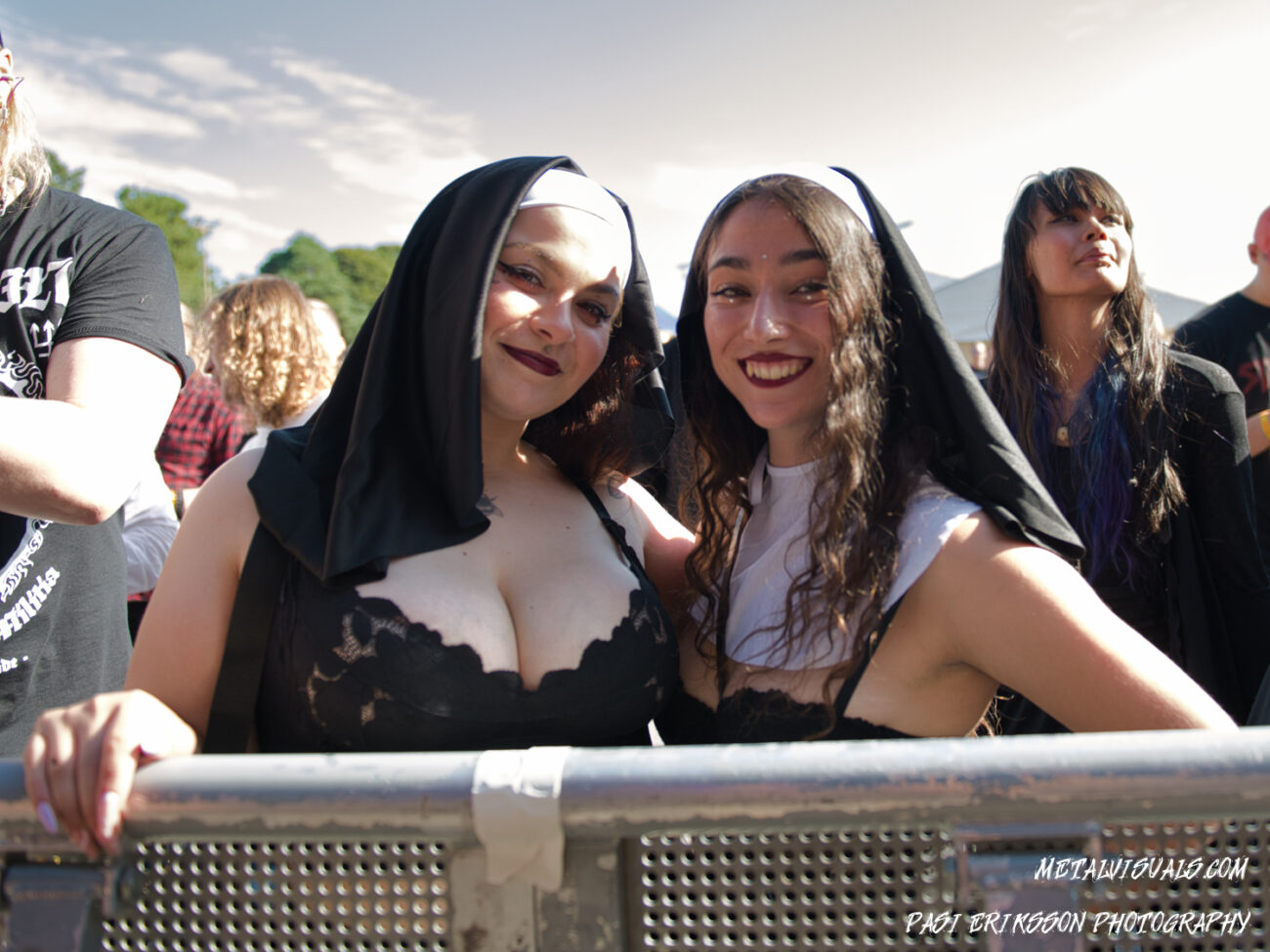
Next up was my most-anticipated band on the first day, Dark Funeral, the self-proclaimed “ineffable kings of black metal.” Formed in Stockholm, Sweden in 1993, Dark Funeral have made quite a name for themselves and are probably one of the most well-known black metal bands around. I had them on heavy rotation when I was first getting into black metal but moved on to other bands until a brief rediscovery with 2016’s excellent comeback album “Where Shadows Forever Reign.” The singles preceding 2022’s “We Are the Apocalypse” didn’t exactly excite me and I’ve still to check out the whole album, but seeing the band live for the first time was something I’d been waiting for quite a while.
While Dark Funeral’s songs carry a menacing vibe, most of them, especially on the earlier albums, struggle to stand out. They certainly aren’t the only black metal band with that kind of situation, but I find it especially true in the case of this band. It was therefore a most pleasant surprise to witness how majestically the band presented their material under the darkened sky. Wearing corpse paint and armor that would make most denizens of Middle-Earth jealous, the band had a mesmerizing stage presence and delivered one of the best black metal shows I’d seen in a long time. Vocalist Heljarmadr had an especially commanding aura. In the end, my only real complaint is that even though Heljarmadr’s vocals are far from bad, they aren’t quite as personal as former vocalist Emperor Magus Caligula’s. Dark Funeral’s songs aren’t the most memorable in the scene, but the band managed to put together a strong and surprisingly varied set that would only be topped by their countrymen Watain on the following day.
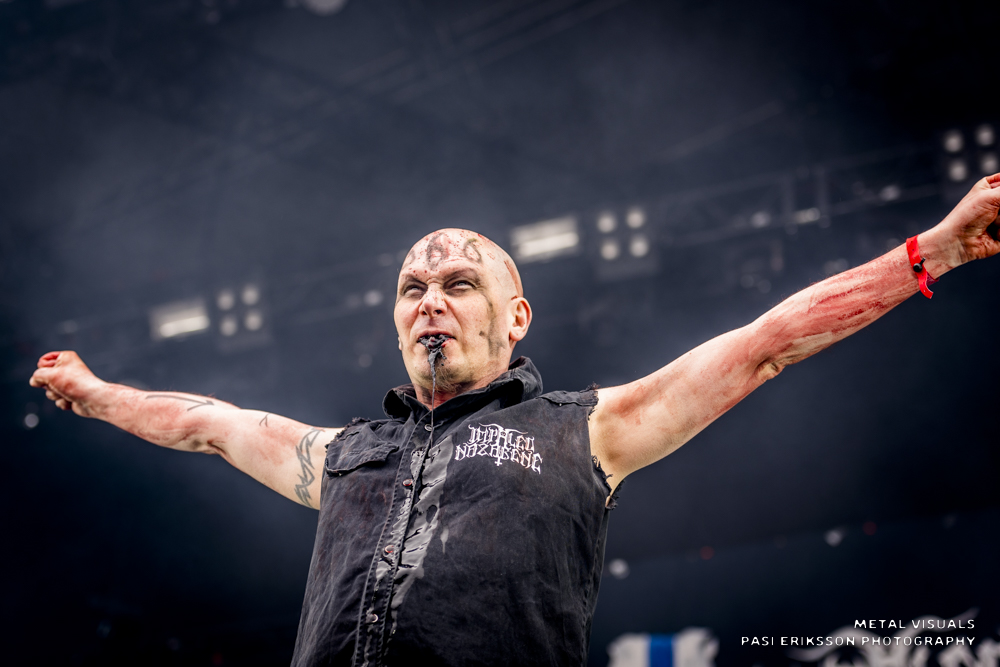
After the Swedes left the stage, it was time for Impaled Nazarene to seize control of the Kaaos Stage. Formed in 1990 when black metal wasn’t as strictly defined, the Finns delivered their punk and grindcore-infused blasphemy with bluster and confidence. Performing such classics as “Sadhu Satana” and “Armageddon Death Squad”, Impaled Nazarene played a show that was good but somehow a bit lacking. Compared to Dark Funeral and Suicidal Angels, the band wasn’t quite as vicious or energetic. The show had plenty of standout moments, such as dedicating a song to the late Alexi Laiho (R.I.P.) who played in the band from 1998 to 2000, but didn’t quite make the leap from great to amazing. That said, it was still enjoyable. The last track ended up being the best, with Spellgoth and Infection from Chamber of Unlight doing backing vocals on the stone-cold classic “Total War – Winter War.”
After Impaled Nazarene, I decided to get a glimpse of Friday’s headliner Apocalyptica. The first day was supposed to be headlined by German power metal legends Helloween, but they had to cancel their show just a couple of days before the festival due to health issues. Many asked the festival to make Blind Guardian the headliner, but they instead booked the Finnish cello metallers to fill the gap. It’s a miracle they could find such a big band on short notice, and Apocalyptica ended up playing a surprisingly metallic set complemented by flashy pyros. That said, they felt a little out of place next to bands like Dark Funeral and Sodom. Covering bands like Metallica and Sepultura, Apocalyptica clearly made an effort to satisfy fans of old-school metal. Based on what I saw, cello still isn’t my favorite instrument and I can’t consider myself an Apocalyptica fan, but the group’s passion and skill made the show much more enjoyable than I had anticipated.
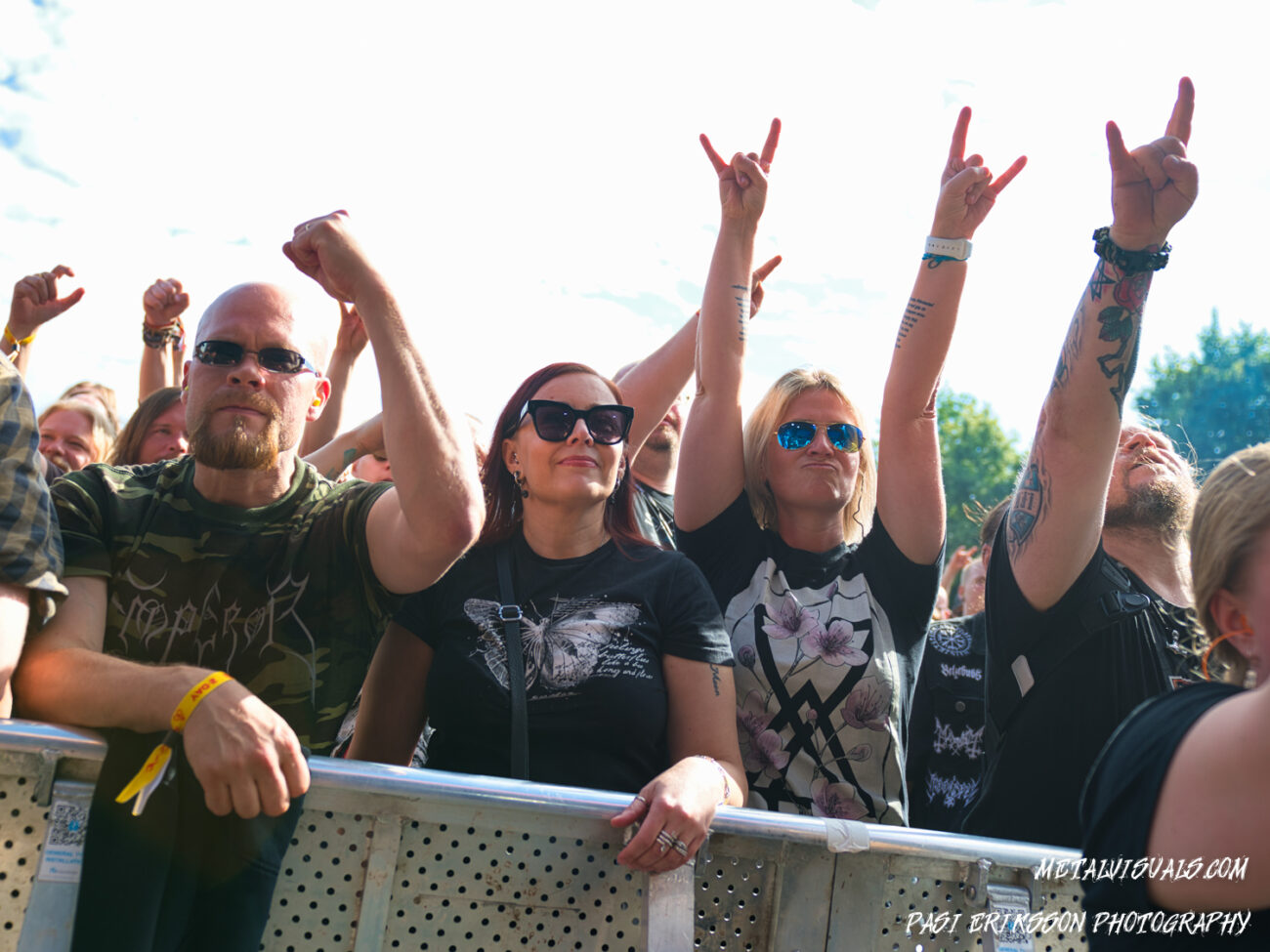
At a quarter past midnight, it was time to close the first festival day with a black metal mass influenced by Orthodox Christianity. Filling the air with ritual incense and stepping forth in monk robes that conceal faces, the people of Hellsinki Metal Festival were blessed by the Polish black metal band Batushka. Or rather, its hollow shell. Catching the black metal world by surprise with their amazing debut album “Литоургиiа” (or “Litourgiya”) in 2015, Batushka (then spelled with the Cyrillic alphabet) made a name for themself by combining black metal with Gregorian chanting and Orthodoxy imagery. To add to the mysticism, the band had decided to stay completely anonymous. Then something ugly happened. The vocalist and the multi-instrumentalist became disputed and kicked each other out of the band, spawning two separate incarnations and lifting the veil of mystery by making their names public. Whereas multi-instrumentalist Krzysztof Drabikowski has managed to make good music after the incident, the version of the band fronted by vocalist Bartłomiej Krysiuk has made a notable effort at tarnishing the legacy of the magnificent debut album. Unfortunately, it was the latter band that performed on the Kaaos Stage.
Now, Krysiuk’s Batushka remains visually stunning and in all fairness, didn’t sound too bad live. But with the legal case still going on and Drabikowski making remarkably better music, I can’t come up with a single reason why I would want to see or listen to this version of Batushka over the other one. When I saw the band before the dispute at Steelfest 2016, it was as if every moment transcended my senses. Seeing Krysiuk’s Batushka now, the only thing I felt was disgust toward greed tearing black metal bands apart (hello, Immortal).
When the gates opened 20 minutes late at 1:20 p.m., I was mentally preparing for a catastrophe, but the first day of Hellsinki Metal Festival turned out to be an absolute blast. The sound quality left me wanting more, and people on social media spoke of serious issues with the cloakroom service, but this was still the most fun I’ve had at a festival this year. The second day was more versatile, and in some ways, even better. Read the second part of the report, which covers bands such as Emperor, Watain, Pentagram, Samael, Leprous and Before The Dawn, over here.
Photos: Pasi Eriksson
Text: Teemu Esko